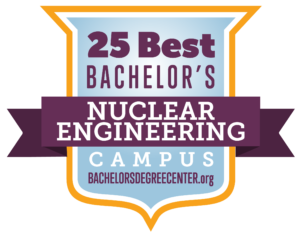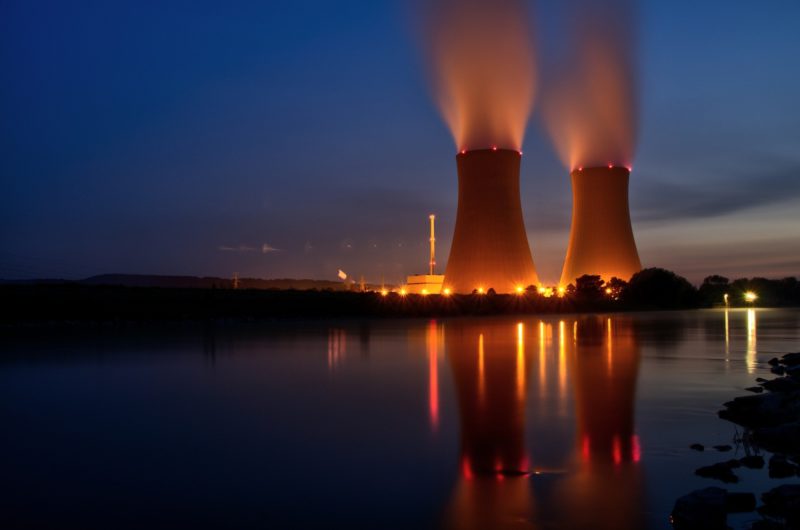
Key Information:
- MIT is the #1 best bachelor’s in nuclear engineering.
- The top nuclear engineering programs are known for their rigorous curriculum that integrates advanced science and engineering principles.
- Graduates are well-prepared for complex jobs in nuclear power, research, and safety.
- It’s important to choose programs that are accredited to ensure quality education and career readiness.
It’s easy to see why employers require degrees for nuclear engineering jobs. These are, after all, complex jobs that require plenty of complex skills. By earning a nuclear engineer degree, you’ll ensure that you’re equipped to handle all of the complexities that the job requires, including working with advanced science and math concepts, blending science with engineering, and working with some of the smallest particles known to humanity. Nuclear engineer degrees can pave the way to a thriving career, and not just because employers require degrees. Education often comes with internships, networking opportunities, and other advantages that can be hard to find outside of college.
Job safety is another reason to get a nuclear engineer degree. Nuclear engineers need a clear knowledge of power plants, nuclear reactors, and even, in some cases, nuclear weapons. Nuclear engineer degrees provide the best way for future nuclear engineers to familiarize themselves with these highly dangerous things. Those who are studying for a nuclear engineering degree learn important safety precautions and protocols.
Methodology: Ranking the Best Nuclear Engineering Degrees
Bachelor’s Degree Center’s mission is to show prospective students the way to the top nuclear engineering schools for their needs. That’s why BDC editors focus on accredited, reputable colleges and universities. Programs are ranked according to their tuition rate (not including financial aid), salary potential, and reputation, using data from IPEDS and Niche.
1. Massachusetts Institute of Technology

The Massachusetts Institute of Technology’s School of Engineering/Department of Nuclear Science & Engineering (MIT) offers a Bachelor of Science degree (BS) in Nuclear Science and Engineering that is among the most elite nuclear engineering degrees available in the marketplace. MIT’s degree in nuclear engineering includes classes in fusion energy, nuclear systems, principles of nuclear radiation measurement, quantum technology, radiation biophysics, analog electronics, and systems analysis of the nuclear fuel cycle, to name just a few.
The Massachusetts Institute of Technology (MIT) was established in 1861, admitting its first class of fifteen students only four years later. ABET accredits the engineering programs offered by this world-class institution. MIT’s campus in Cambridge runs alongside the Charles River on the opposing side to Boston University.
What We Like: The Massachusetts Institute of Technology ranks among the top global scores as noted by many collegiate ranking services.
Degree: BS in Nuclear Science and Engineering
Massachusetts Institute of Technology BS in Nuclear Science and Engineering
2. Georgia Institute of Technology

The Georgia Institute of Technology offers a BS in Nuclear & Radiological Engineering that offers two concentrations within the degree in nuclear engineering program offered. The two academic emphases for Georgia Tech’s nuclear engineering degrees include radiological science & engineering or nuclear engineering. Georgia Tech’s curriculum for the nuclear engineering degree programs includes basic principles courses in nuclear power economics, detection instruments, criticality safety, materials management, and regulatory requirements, to name a few.
The Georgia Institute of Technology is a multiple-campus research university that was established in 1885. As a space-grant higher learning institution, the Georgia Institute of Technology (is home to approximately 36,350 students on its campuses in Atlanta, Savannah, France, China, Ireland, and Singapore.
What We Like: The Georgia Institute of Technology was founded after the Civil War in an effort to rebuild the industrial southern US.
Degree: BS in Nuclear and Radiological Engineering
Georgia Institute of Technology BS in Nuclear & Radiological Engineering
3. University of California, Berkeley

The University of California, Berkeley offers a BS in Nuclear Engineering that has received accreditation of ABET. Students graduating from the University of California (UC@B) at Berkeley’s degree in nuclear engineering program enter the workforce in academia, national labs, or government agencies, applying the experimental and analytic tools and skills learned at the University of California. All nuclear engineering degree candidates have the opportunity to work in nuclear labs to gather professional experience during their baccalaureate studies.
The University of California, Berkeley is considered the state’s flagship. Established in 1868 as California’s first school under the Morrill Land Act, UC Berkeley is now home to approximately 43,050 students vying for degrees offered by UC Berkeley’s fourteen colleges/schools.
What We Like: UC Berkeley’s distinguished alumni include heads of state, chief justices, Nobel laureates, and Turing award winners, among others.
Degree: BS in Nuclear Engineering
University of California, Berkeley BS in Nuclear Engineering
4. University of Michigan-Ann Arbor

The University of Michigan’s College of Engineering offers a BS in Nuclear Engineering & Radiological Sciences that offers several academic specialties to degree candidates. UM’s nuclear engineering degrees are available in plasmas/nuclear fusion, materials & radiotin effect, radiation measurements, and fission systems/radiation transport. Students enrolled in the University of Michigan’s degree in nuclear engineering program find rewarding careers in medical physics, agricultural research, nuclear power plants, or water treatment/environmental studies, among others.
Established in 1817, the University of Michigan (UM at Ann Arbor) is a multiple-campus university that is home to approximately 45,860 students. The University of Michigan’s campus in Ann Arbor includes a large arboretum managed by the school and students.
What We Like: The University of Michigan was founded prior to its statehood two decades later, in 1837.
Degree: Nuclear Engineering & Radiological Sciences
University of Michigan BS in Nuclear Engineering & Radiological Sciences
5. University of Illinois at Urbana-Champaign

The University of Illinois’ Grainger College of Engineering offers a Bachelor of Science degree (BS) program in Nuclear, Plasma, and Radiological Engineering that is ranked among the Midwest’s finest nuclear engineering degrees. Students enrolled in UM’s degree in nuclear engineering program have three academic tracks from which to choose – radiological, medical & instrument applications, plasma & fusion, and power, safety & the environment. Each of these nuclear engineering degree programs requires the completion of 128 semester units to graduate.
The University of Illinois at Urbana-Champaign was established as a public institution of higher education in 1867. The school serves more than 50,550 students from its campus in the twin cities of Champaign and Urbana.
What We Like: The University of Illinois is recognized as a space-grant, land-grant, and sea-grant university.
Degree: BS in Nuclear, Plasma, and Radiological Engineering
University of Illinois BS in Nuclear, Plasma, and Radiological Engineering
6. University of Texas at Austin

The University of Texas’s Cockrell Engineering School offers a Bachelor of Science degree (BS) program in Physics that offers an opportunity to gain an undergraduate Nuclear and Radiation Engineering Program certificate. The University of Texas Austin’s nuclear engineering degrees offer an academic emphasis in either radiation physics (among others), which both require the completion of 126 semester units. The radiation physics degree in nuclear engineering program is a great starting program for those students who wish to enter the field of nuclear engineering or radiation engineering or to further their studies.
Established in 1883, the University of Texas (UT at Austin) is the Lone Star State’s flagship campus with a student enrollment of approximately 51,550 students. The University of Texas, a recognized public ivy league higher learning institution, is also a space-grant school that is comprised of seventeen libraries, six museums on its 300+urban acre campus.
What We Like: The school also operates a research campus north of the main campus and is home to the tallest bell tower in the state.
Degree: BS in Physics
University of Texas BS in Physics — Nuclear
7. North Carolina State University

North Carolina State University’s Nuclear Engineering Department offers a Bachelor of Science degree (BS) program in Nuclear Engineering is one of North Carolina’s finest nuclear engineering degrees available in the marketplace. Students enrolled in NC State’s degree in nuclear engineering program may opt for an accelerated baccalaureate and master’s degree combo program. North Carolina State University’s degree in nuclear engineering program requires the completion of 123 credit units to graduate. Classes for this degree include fluid mechanics, nuclear reactor energy conversion, energy thermodynamics, and physics for engineers and scientists, to name a few.
Founded in 1887, NC State or North Carolina State University is a land-grant university in Raleigh, North Carolina. This space-grant and sea-grant institution is home to 36,150 students, which makes North Carolina State University the largest of all institutions of higher education in the state.
What We Like: North Carolina State University was established to focus on practical and liberal education, including mechanical and agricultural arts.
Degree: BS in Nuclear Engineering
North Carolina State University BS in Nuclear Engineering
8. Colorado School of Mines

The Colorado School of Mines offers a BS in Electrical Engineering that is ranked among the top nuclear engineering degrees. The Colorado School of Mines’ degree in nuclear engineering program offers four academic concentrations in energy systems, integrated circuits & electronics, information systems & sciences, and wireless communications. Degree candidates enrolled in Colorado School of Mines’ undergraduate degree program must complete 128 semester credits to graduate. Classes include feedback control systems, microcomputer architecture & interfacings, differential equations, and digital logic, among others.
Established in 1974, the Colorado School of Mines is a public school dedicated to math, science, and engineering. The Colorado School of Mines’ s suburban campus in Golden is home to approximately 6,050 students.
What We Like: With regard to mineral & mining engineering, the Colorado School of Mines is recognized by QS World Rankings as the top higher learning institution.
Degree: BS in Electrical Engineering
Colorado School of Mines BS in Electrical Engineering
9. University of Wisconsin — Madison

The University of Wisconsin Engineering College offers one of Wisconsin’s finest nuclear engineering degrees with its Bachelor of Science degree (BS) program in Nuclear Engineering that offers students two academic tracks in radiation sciences, power. Degree candidates seeking to finish this University of Wisconsin Madison degree in nuclear engineering program must complete 129 semester units to meet graduation requirements. Classes included for this degree’s curriculum are nuclear reactor theory, ionizing radiation, nuclear instrumental lab, and general physics, to name a few.
Founded in 1848 as a school dedicated to research, the University of Wisconsin (UW at Madison) is home to approximately 44,350 students. The university’s campus covers nearly 1,000 acres.
What We Like: UW at Madison is organized under thirteen colleges/schools and has a living alumnus that nears 500,000.
Degree: BS in Nuclear Engineering
10. Texas A&M University

The Nuclear Engineering Department at the Texas A&M University offers one of the Lone Star State’s finest nuclear engineering degrees with its Bachelor of Science degree (BS) program in Nuclear Engineering. Students enrolled in Texas A&M’s degree in nuclear engineering program take classes in experimental physics, Newtonian mechanics for engineering, statistics for nuclear engineering, fluid mechanics, and radiological safety, to name a few.
Texas A&M University was established as a land-grant mechanical college under the Morrill Land Grant Act in 1971. Texas A&M University is also a space-grant and sea-grant school, which makes Texas A&M University the school in the state with all three university designations.
What We Like: Texas A&M University’s student enrollment that nears 70,000 students makes the College Station, TX, school among the largest of all schools in the United States.
Degree: BS in Nuclear Engineering
Texas A&M University BS in Nuclear Engineering
11. The Ohio State University

The Ohio State University’s Engineering College offers a BS in Electrical and Computing Engineering (CSE) that is considered among Ohio’s top ABET-accredited nuclear engineering degrees. Students enrolled in OSU’s degree in nuclear engineering program have a variety of opportunities to study abroad or participate in international internships during their academic tenure. Classes for this degree program in nuclear engineering include fundamentals of engineering,
Founded as a land-grant higher learning institution, Ohio State University (OSU) is also a sea-grant and space-grant University in Columbus. Additionally, nearly 69,000 students attend classes offered online and on the school’s five regional campuses in Mario, Newark, Wooster, Lima, and Mansfield.
What We Like: President Hayes, prior to taking the highest office in the land, was fundamental in developing the school into the comprehensive university that it is today.
Degree: BS in Electrical and Computer Engineering
Ohio State University BS in Electrical and Computer Engineering
12. Kansas State University

Kansas State University offers one of Kansas’ finest nuclear engineering degrees with its Bachelor of Science degree (BS) program in Mechanical & Nuclear Engineering with a nuclear option. Students enrolled in Kansas State University’s degree in nuclear engineering program are required to complete 125 semester units to meet the program’s graduation requirements. Students graduate from Kansas State University’s mechanical and nuclear engineering can opt for a concurrent Bachelor of Science in Mechanical & Nuclear Engineering along with a Master of Business Administration degree (MBA) program.
Established under the Morrill Act in 1863, Kansas State University is a research higher learning institute that serves more than 20,550 students online and from its Manhattan, Kansas campus. Kansas State University operates satellite and branch facilities in Salinas and Olathe.
What We Like: Kansas State University holds the distinction of being the first of all institutions of higher education that were established in the state of Kansas.
Degree: BS in Mechanical and Nuclear Engineering
Kansas State University BS in Mechanical and Nuclear Engineering
13. University of South Carolina

The University of South Carolina offers one of the State of South Carolina’s finest nuclear engineering degrees with its Bachelor of Science degree (BS) program in Electrical Engineering. Most students complete this degree in four years, but many opt for an accelerated dual degree in nuclear engineering program that offers degree candidates both an undergraduate and a graduate degree in as few as five years.
Established as SC College in 1801, the University of South Carolina is a research school and the flagship school of the University of South Carolina system. Additionally, this sea-grant university operates a number of schools throughout the state with a system-wide student enrollment that exceeds 52,550 students.
What We Like: The University of South Carolina’s first-class enrolled a total of nine students in 1805.
Degree: B.S. in Electrical Engineering
University of South Carolina B.S. in Electrical Engineering
14. University of Idaho

The University of Idaho’s Engineering College offers a BS in Electrical Engineering that is among the top nuclear engineering degrees available in the marketplace. US News recognizes the University of Idaho as the best value of a public school in the western US. The University of Idaho’s degree in nuclear engineering program has received accreditation from the Accreditation Commission of ABET. Classes for Idaho’s undergraduate degree includes signals and systems, microcontrollers, digital lab, energy systems, and probability and statistics, plus an electrical engineering senior design project, among others.
Established by the Idaho territorial legislature in 1889, the University of Idaho was created as a result of the Morrill Land Grant Act. The University of Idaho’s rural campus in Moscow serves more than 10,550 students and covers more than 1,400 acres.
What We Like: The University of Idaho held the distinction as Idaho’s only higher learning institution for more than seven decades.
Degree: BS in Electrical Engineering
University of Idaho BS in Electrical Engineering
15. University of Tennessee — Knoxville

The University of Tennessee’s Department of Nuclear Engineering offers one of Tennessee’s top nuclear engineering degrees with its Bachelor of Science degree (BS) program in Nuclear Engineering with a radiological emphasis. Students enrolled in the University of Tennessee’s degree in nuclear engineering program have the option of enrolling in an accelerated bachelor’s and master’s degree combo program that can be finished in only 60 months or five years. Students participate in nearby associations with the Y‑12 National Security Complex as well as the Oak Ridge Lab. Degree candidates have the opportunity of selecting from four minor in nuclear safety, concepts of cybersecurity, nuclear decommissioning, and reliability and maintainability engineering.
The University of Tennessee (UT at Knoxville) was founded as Blount College in 1794 but became East Tennessee University in 1840. More than 30,550 students attend classes offered by UT studying from the university’s eleven colleges/schools.
What We Like: The University of Tennessee is recognized to contribute more than 1.5 billion dollars to the state’s economy.
Degree: BS in Nuclear Engineering: Radiological
University of Tennessee BS in Nuclear Engineering: Radiological
16. Oregon State University

The Engineering College at Oregon State University offers a BS in Nuclear Engineering that is one of Oregon’s top nuclear engineering degrees available in the marketplace. Oregon State University’s degree in nuclear engineering program has received accreditation from the Engineering Accreditation Commission of ABET. Students must complete classes in heat transfer, fluid mechanics, materials science, nuclear rules & regulations, nuclear reactor labs, neutronic analysis, radiation protection, and radiation shielding & external dosimetry, to name a few.
Established under the Morrill College Land Grant Act in 1868, Oregon State University is one of only a handful of schools that are also sea-grant, space-grant, and sun-grant institutions of higher education.
What We Like: Oregon State University holds the distinction of being the largest, in terms of enrollment, of all schools within the state.
Degree: BS in Nuclear Engineering
Oregon State University BS in Nuclear Engineering
17. Temple University

Temple University’s Engineering College offers a BS in Engineering Technology, which is one of the top nuclear engineering degrees available on the east coast. This degree in nuclear engineering program offers degree candidates four academic concentrations in computer technology, construction technology, mechanical/manufacturing technology, or the general technology track. Students are offered cooperative education options for this 124 ABE-accredited degree program. Degree candidates are offered the opportunity to study internationally during the summer or semester. Classes for this degree include engineering economics, thermodynamics, applied strength, electrical circuits, and electrical devices and systems, plus a capstone project.
Established in 1884, Temple University began when Minister Russell Conwell began tutoring a student each night. Temple University is a public institution that operates multiple campuses that serve approximately 39,050 students.
What We Like: Temple University holds the distinction of preparing the largest number of Pennsylvania’s professional practitioners.
Degree: BS in Engineering Technology
Temple University BS in Engineering Technology
18. Rensselaer Polytechnic Institue

Rensselaer Polytechnic Institute’s Engineering School offers one of the Empire State’s finest nuclear engineering degrees with its Bachelor of Science degree (BS) program in Nuclear Engineering. Degree candidates enrolled in Rensselaer Polytechnic Institute’s degree in nuclear engineering program can select from concentrations in reactor materials, thermal-hydraulics, reliability/safety, fission reactor, reactor engineering, and health physics. Classes for this degree program include engineering analysis, nuclear phenomena, fundamentals of nuclear engineering, fluid mechanics, nuclear instrumentation & measurement, and modeling & analysis of uncertainty, to name a few.
Founded in 1824, Rensselaer Polytechnic Institute operates several campuses in Troy, New York, as well as satellite facilities in Groton and Hartford, Connecticut. The school’s campuses serve more than 8,050 students.
What We Like: Rensselaer Polytechnic Institute is recognized as the oldest technological university in the English-speaking world.
Degree: BS in Nuclear Engineering
Rensselaer Polytechnic Institute BS in Nuclear Engineering
19. University of Massachusetts-Lowell

The University of Massachusetts-Lowell offers one of the top nuclear engineering degrees with its Bachelor of Science degree (BS) program in Chemical Engineering with an academic emphasis in Nuclear Engineering. Students enrolled in the University of Massachusetts at Lowell’s ABET-accredited degree in nuclear engineering program take classes in biology for engineers, fundamentals of electricity, organic chemistry, thermodynamics, fluid mechanics, separation process, chemical reaction engineering, and engineering and ethics, to name a few. All degree candidates must complete 134 credit units to meet the engineering program’s graduation requirements.
Established as a teacher’s training school in 1894, the University of Massachusetts (UMass at Lowell) is a multi-campus institution of higher education that serves more than 18,250 students.
What We Like: The University of Massachusetts holds the distinction of being the first university across the country to award a degree in music education.
Degree: BS in Chemical Engineering: Nuclear Engineering
20. Pennsylvania State University

Pennsylvania State University offers one of the top Pennsylvania nuclear engineering degrees with its Bachelor of Science degree (BS) program in Nuclear Engineering. Students interested in PSU’s degree in nuclear engineering program can begin the degree at any of the Pennsylvania State University’s campuses but must complete the degree at the University Park Campus. Degree candidates are mandated to complete 129 semester credits to graduate. The core curriculum for the degree includes the strength of materials, vector analysis, fluid flow, thermodynamics, intro to reactor design, and nuclear & radiochemistry, to name a few.
Pennsylvania State University (PSU) was founded in 1855 and is among only a handful of institutions of higher education to possess all four-university designation in space, land, sea, and sun.
What We Like: Uniquely, Pennsylvania State University operates two law schools in University Park and another in Carlisle, PA.
Degree: BS in Nuclear Engineering
Pennsylvania State University BS in Nuclear Engineering
21. University of Pittsburgh

The Swanson Engineering College at the University of Pittsburgh offers one of the top Pennsylvania nuclear engineering degrees with its Bachelor of Science in Engineering degree (BSE) program with a specialty in Nuclear Energy. Students enrolled in the University of Pittsburgh’s PSU’s degree in nuclear engineering program complete classes in applied fluid mechanics, nuclear plant technology, fundamentals of nuclear reactors, mechanical measurements, and intermediate electricity & magnetism, to name a few. Total coursework for graduation equals 129 semester credits.
Established as an academy in 1787 when the city was the American Frontier, the University of Pittsburgh is now a comprehensive university that serves nearly 29,000 students each year. The University of Pittsburgh is organized into seventeen graduate and undergraduate schools.
What We Like: Several buildings located on the university’s campus are listed with the country’s National Register of Historic Places.
Degree: BSE in Engineering Science: Nuclear Energy
University of Pittsburgh Degree: BSE in Engineering Science: Nuclear Energy
22. Virginia Commonwealth University

Virginia Commonwealth University’s Engineering College/Mechanical & Nuclear Engineering Department offers a Bachelor of Science degree (BS) program in Mechanical Engineering with an academic track in Nuclear Engineering that is one of Virginia’s top nuclear engineering degrees. Students enrolled in Virginia Commonwealth University’s degree in nuclear engineering are required to completed either a cooperative education requirement or a supervised and pre-approved internship. Students graduate and choose to further their education or enter the workforce in medicine, engineering, law, or even business, among others.
Established in 1838 by the merger of two higher learning institutions, Virginia Commonwealth University is a state-funded university that serves approximately 29,450 students online and from its Richmond campus.
What We Like: Virginia Commonwealth University operates two primary campuses in the Richmond area, plus several international facilities in Qatar and other locations.
Degree: BS in Mechanical Engineering – Nuclear Engineering
Virginia Commonwealth University BS in Mechanical Engineering – Nuclear Engineering
23. Tarleton State University

Tarleton State University offers a BS in Physics and Nuclear Engineering that is ranked among the Lone Star State’snuclear engineering degrees. This degree in nuclear engineering requires the completion of 120 semester units over eight-semesters or four years. Students graduate from Tarleton State University’s undergraduate engineering degree program to further their education or to enter the workforce as a physicist, a bioengineer, or a medical technician, to name a few.
Established in 1899, Tarleton State University is a member school of the Texas A&M University system in central Texas. The university’s campus in Stephenville is home to approximately 13,150 students.
What We Like: Tarleton State University began with an endowment by its namesake and now offers about 100 academic degree and certificate programs.
Degree: BS in Physics: Nuclear Engineering
Tarleton State University BS in Physics and Nuclear Engineering
24. Idaho State University

Idaho State University’s School of Science & Engineering offers a Bachelor of Science degree (BS) program in Nuclear Engineering (NE) that ranked among Idaho’s top nuclear engineering degrees. Students enrolled in Idaho State University’s degree in nuclear engineering study at one of only 25 institutions of higher education with a nuclear reactor. This ABET-accredited degree program is one of only six programs that are located to the west of the Mississippi River. Idaho State University is located less than one hour from the national lab located in Idaho.
Founded as a state college in 1947, Idaho State University is now a comprehensive university that offers more than 275 academic and certificate programs. The university’s campus in Pocatello is home to approximately 12,350 students.
What We Like: Idaho State University offers degree candidates and students an impressive 13 to 1 student to faculty ratio.
Degree: BS in Nuclear Engineering
Idaho State University BS in Nuclear Engineering
25. South Carolina State University

South Carolina State University offers one of the South’s finest nuclear engineering degrees with its Bachelor of Science degree (BS) program in Nuclear Engineering. The degree in nuclear engineering offered by South Carolina State University began with five students and had an enrollment of 454 students in 2019. South Carolina State University’s nuclear engineering program has received accreditation from ABET. It is noted that SC State offers the only baccalaureate degree program in nuclear engineering in South Carolina.
Established as a land-grant university in 1896, South Carolina State University now serves approximately 3,000 students online and from its Orangeburg campus.
What We Like: South Carolina State University is the only HBCU land-grant university in the state and is also a member school of the Thurgood Marshall College Fund.
Degree: BS in Nuclear Engineering
South Carolina State University BS in Nuclear Engineering
Is ABET Accreditation Important for Nuclear Engineering?
What degree do you need for nuclear engineering? Why get a nuclear engineer degree? There are several reasons why you’ll need a nuclear engineering degree to get a nuclear engineering job, but the simplest answer is that employers require it. To go into the nuclear engineering field, you should have a bachelor’s degree or higher.
So what degree do you need to be a nuclear engineer? At the very least, you’ll need a BS in nuclear engineering. Some nuclear engineers also earn a master’s degree or doctoral degree. But there are a lot of colleges with nuclear engineering major programs. How do you choose between nuclear engineer colleges?
When looking for the best nuclear engineering schools in the world, the first thing you should do is check for accreditation. This can mean national or regional accreditation, but either way, you’ll want a school that can prove that it has high standards for education. Almost all of the best schools for nuclear engineering are ABET-accredited. That includes private and public university programs.
With some subjects, though, it’s not always enough that the school is accredited. You’ll want to make sure that the program is accredited, too. If you’re going into nuclear engineering, this means looking for ABET-accredited nuclear engineering schools. ABET, or the Accreditation Board for Engineering and Technology, is “a nonprofit, non-governmental agency that accredited programs in applied and natural science, computing, engineering and engineering technology.”
Other ABET-accredited schools include:
- University of Florida in Gainesville
- United States Military Academy at West Point
- Missouri University of Science
- University of New Mexico
- Purdue University (West Lafayette, IN)
- Missouri University of Science and Technology
Ideally, you’ll find an ABET-accredited nuclear engineering program when you choose your school. If a program is ABET-accredited for nuclear engineering technology, it means that the program meets ABET’s trusted standards, so you can rest assured that you’ll get a quality, relevant education.
That’s not to say that you should necessarily avoid every non-ABET accredited nuclear engineering degree colleges. There are some excellent programs that haven’t been accredited for one reason or another. For example, you may find an engineering program that’s in the process of earning its accreditation status.
Still, your safest bet is looking for the ABET seal of approval right off the bat. With a non-accredited program, you may have to do a lot of digging to find the best nuclear engineering undergraduate schools. The best thing about ABET is that it does the digging for you, so you don’t have to worry about getting a less than amazing education.
Plus, ABET accreditation can help you when it’s time to apply for jobs or graduate programs. Employers tend to recognize ABET-accredited programs, so they won’t worry about your education when they see the program on your resume.
What Will I Learn in a Nuclear Engineering Degree Program?
Nuclear engineering degree requirements are challenging, and with good reason. As covered above, nuclear engineering requires a lot of complex math, science, and engineering skills. It also uses a lot of relatively new technology, so at the end of the day, this career covers every letter of the STEM acronym.
A challenging career requires a challenging degree to go with it, and by meeting a program’s nuclear engineering bachelor degree requirements and earning a diploma, you’ll prove that you have what it takes to thrive in a nuclear engineering career.
During the first year or two of college, nuclear engineering students generally take a lot of general courses, depending on the core requirements for their university. However, since nuclear engineering is a BS degree, these students usually aren’t required to take quite as many general courses as their friends in BA programs. These students also take higher-level math courses such as trigonometry. Other nuclear engineering degree requirements include upper-level science courses, safety courses, and introductions to the nuclear engineering career as a whole.
Many top nuclear engineering colleges also ask that students take several electives as part of their nuclear engineer degree requirements. These electives usually focus on specific areas of nuclear engineering. For students who know exactly what they want to do with their degrees, these elective courses can help them tailor those degrees toward their career goals.
Related Rankings:
15 Best Online Bachelor’s in Nuclear Engineering
